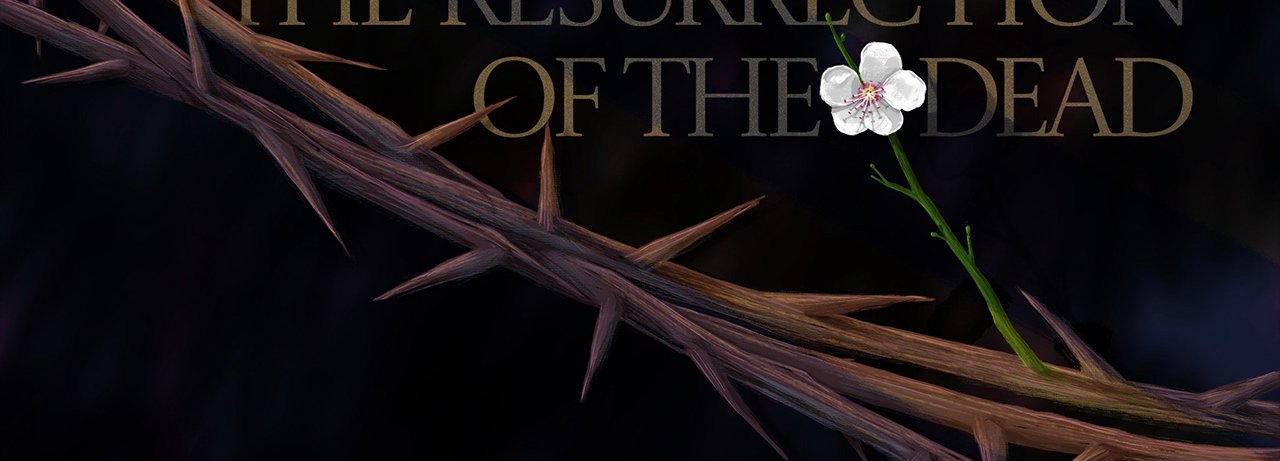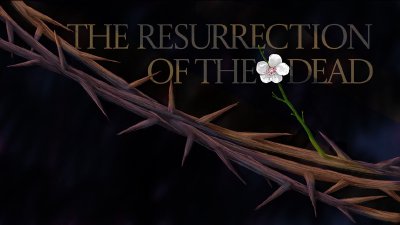


Resurrection of the Dead
New Creation
April 28, 2024 • Rev. James M. Holland • 1 Corinthians 15:20–28
I just got most of my garden planted on Monday. Addy was a lot of help. I bribed her into helping me pull up the winter garden of kale, spinach, greens and arugula by telling her she could drive the lawnmower and pull the wagon to deposit the refuse from the beds. Anyway, we toil in hope. Even hobbling around on a bad leg, I whispered a prayer of thanksgiving for the feel, smell, and gift of good dirt...and especially my small tomato plants. I mention my garden because our text this week describes Jesus as the firstfruits of those who have died. It might seem a strange metaphor to us who live in the relative safety of suburbia and assume a food chain that is normative and stable. We don’t live in an agrarian culture so it hard to underscore the magnitude of what Paul is saying. In Israel, and most of the Roman culture, the firstfruits of your crop were something to be celebrated. Israel had a festival to celebrate it. All agrarian cultures did because all your money, all your hopes, your very life was plowed into the soil. If the harvest doesn’t come in, you were financially ruined or possibly even dead. So, when the firstfruit was picked—the first grape or olive or wheat or, in my case, tomato—it was a time for rejoicing. It meant for them they would not starve, the harvest was coming; and, for me, it means bushels of tomatoes are coming! That first tomato of the season is for me an actual taste of the future as I anticipate the glory of endless tomato sandwiches slathered in mayo and home-cured bacon. It is a great image, exciting actually, because it means with Jesus’ resurrection, God’s future has entered our present reality. Confused? Well, on Sunday, we will talk about it. We will also welcome new members, have a couple of baptisms, and celebrate our high school graduates, all sorts of “firstfruits” of our ministry at St. Patrick and the promise of a glorious future!
What if the Resurrection Didn't Happen?
April 21, 2024 • Rev. James M. Holland • 1 Corinthians 15:12–19
Owen Meany is a fictional character in John Irving’s novel, A Prayer for Owen Meany. If I could give you a one paragraph commentary on I Corinthians 15, it might be this. Here is what he says: I find that Holy Week is draining; no matter how many times I have lived through his crucifixion, my anxiety about his resurrection is undiminished—I am terrified that, this year, it won’t happen; that, that year, it didn’t. Anyone can be sentimental about the Nativity; any fool can feel like a Christian at Christmas. But Easter is the main event; if you don’t believe in the resurrection, you’re not a believer. (John Irving, A Prayer for Owen Meany) Paul would like that. In fact, Paul actually hints at that when he says that, by denying the resurrection, perhaps many had believed in vain. Resurrection is the gospel! In our text this week, Paul basically asks those who are doubting the bodily resurrection of Jesus to have the courage of their convictions, and then he outlines a bunch of things that are true if there is no resurrection of the dead. It is terrifying. Terrifying but essential. This Sunday, we will talk about what life and reality look like if Jesus is not raised from the dead. We are so often tempted to think of Christianity only in terms of morality, as we often see parents who have long abandoned the church return, only so that their children can get a moral basis for life. Paul would basically tell you that is really a ridiculous proposition. How so? Join us Sunday and we will talk about it.
The Ressurection in the Scriptures
April 14, 2024 • Rev. Will Weir • 1 Corinthians 15:3–41
Like many Memphians this past week, I took a heliotropic pilgrimage to the booming metropolis of Jonesboro, Arkansas, in order to witness the rare occasion of TOTALITY. I like to put it in all caps to capture how apocalyptic it felt. It was a transcendent experience, and a communal one, too, to be with other folks who were well-versed in feasting on God's glory through creation. One thought did occur to me after, though, as someone commented on the rarity of the eclipse, and then someone else pedantically commented on how the moon was literally always eclipsing the sun from the right vantage point. There's a metaphor there for Christ's appearances after his resurrection, which we'll be looking at this Sunday. We think it's a glimpse of a rare occasion when, in fact, it's a rarely available window into a constant glory. (I guess it's my turn to be pedantic.) The resurrected Jesus marks the coming "new normal" for humanity, and I yearn with you for the day when faith becomes sight. See you Sunday!
Stand Fast in the Gospel
April 7, 2024 • Rev. James M. Holland • 1 Corinthians 15:1–2
We are now in the season of Eastertide. It’s the season after the Resurrection and lasts until Pentecost so we have roughly seven Sundays. During Eastertide, we celebrate the Resurrection. This year we are really celebrating it as we will be talking about The Resurrection of the Dead for the next several weeks. To do this, we are looking at the clearest teaching in the Bible on resurrection, I Corinthians 15. Why do we do this? Because what we believe about the resurrection of the dead affects how we live and view the world right now. N. T. Wright says that there are two questions that matter: “First, what is the ultimate Christian hope? Second, what hope is there for change, rescue, transformation, new possibilities with the world at present.” (N. T. Wright, Surprised by Hope) So join us Sunday as we look at why Paul says to “stand fast in the gospel” and basically, the gospel is resurrection! The implications are enormous, not only for eternity but for us right now. Hope to see you Sunday. Remember, all Sunday school classes will meet at their normal time of 9:15am, and worship is at 10:30.
The Resurrection and the Re-Enchantment of the World
March 31, 2024 • Rev. James M. Holland • Matthew 19:27–30
Easter Sunday! It is sort of like the Super Bowl of the people of God. It is the day we celebrate the resurrection of Jesus from the dead. As C. S. Lewis points out, “To preach Christianity meant (to the Apostles) primarily to preach the Resurrection… The Resurrection is the central theme in every Christian sermon reported in the Acts. The Resurrection, and its consequences, were the ‘gospel’ or good news which the Christians brought.” (C. S. Lewis, Miracles) In other words, if there is no resurrection, Jesus is just another religious guru. I use the word enchantment in the title of this week’s sermon because a lot of people are still trying to come to grips with something that is unique to our day, and even people who don’t believe are a little perturbed about it. If there is no God, then we live in a closed universe and nothing really means anything. In other words, if there is no God, the world has been dis-enchanted. We are truly alone, with no meaning or purpose other than what we can impose on the world. There is much sadness about this because, if this is true, nature is not really saying anything to us. People are just other autonomous beings who might delight or infuriate us, but love is an artificial construct that we might give credence to but even that won’t last. Then we come face to face with a startling claim that death is not the final answer. God actually entered the world and, when he was raised from the dead, promised that in his leaving we would actually have more of him in the gift of the Holy Spirit. There are profound implications for us as we walk among the ruins of our day. It is quite exciting, and we will talk about it Sunday. Remember, for Easter we’ll have two worship services, beginning at 9:00 and 11:00, so there is no Sunday School. So beloved, let’s prepare our hearts to celebrate in worship together around Jesus’ table, and also as we throw feasts at our scattered tables afterwards and share the bounty with our family and friends.


